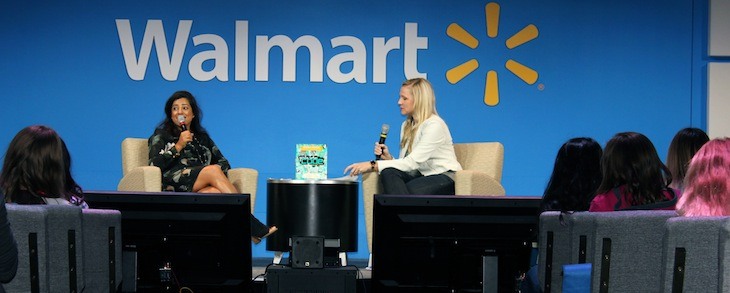Girls Who Code CEO encourages girls to become coders; Wal-Mart pledges $250,000 to the effort
by September 6, 2017 5:20 pm 2,144 views

Reshma Saujani (left), founder and CEO of Girls Who Code speaks about coding as Becky Schmitt, senior vice president of global people for Wal-Mart, and nearly 300 middle-school aged girls listen.
Reshma Saujani, founder and CEO of Girls Who Code, encouraged nearly 300 middle school-aged girls to pursue careers in technology.
On Wednesday (Sept. 6), Wal-Mart announced a multi-year sponsorship and a $250,000 gift to Girls Who Code, a nonprofit organization working to close the gender gap in technology by encouraging girls to join the engineering field.
Saujani and Arkansas Lt. Gov. Tim Griffin spoke to the girls from 14 Northwest Arkansas schools about opportunities for women in science, technology, engineering and math (STEM) fields in an event at the David Glass Technology Center in Bentonville. Saujani also took part in the diversity and inclusion summit Wal-Mart hosted for its employees later in the day.
Before starting the organization in 2010, Saujani ran for U.S Congress in New York’s 14th Congressional district and found out about the gender gap in the technology field. She said she was terrified of math and science but after losing the congressional race, it gave her the strength to establish the organization.
“I would say Girls Who Code is like unicorns and rainbows,” said Saujani, a Yale Law School graduate. “We have so much power. Sometimes we don’t even know.”
When asked about her goal, Saujani joked, “World domination.”
In a Walmart.com blog, Fiona Tan, senior vice president of Customer Technology at Walmart Labs, said the retailer’s contribution to Girls Who Code will help the organization reach its goal of growing from 1,000 clubs to 3,600 clubs in all 50 states. After the event, Saujani said the goal in Arkansas is to increase the number of clubs to 50, from seven, this year.
“Technology is changing the way we live and work,” she said. “That means we’ve got to learn how to code,” she said. “I see that girls are change makers.”
More than, 500,000 jobs, paying $120,000 annually, are available in computer engineering. But less than one in five in computer classes are girls. One doesn’t need to be perfect at math and science, but they need to have a passion for problem solving, she said.
Saujani also spoke about her book “Girls Who Code: Learn to Code and Change the World” and Ada Lovelace, who’s considered the first computer programmer. The book, which was given to each student at the event, includes terms for coders and tips for problem solving, such as getting comfortable with not knowing the answers and finding the solution.
“The whole process of figuring something out is kind of fun,” she said.
Saujani, said she previously worked on campaigns for Hillary Clinton, and she was a role model for her along with her daughters. Her time working on the Clinton campaigns helped her to learn to persevere through failure. She also encouraged the students to run for office.
“It’s scary and amazing,” she said, and that it taught her how to raise money, to sell herself and learn public speaking. “I will literally nag you and nag you and nag you until you say, ‘yes.’”
Students also had an opportunity to ask Saujani questions, and she was asked about what to do when someone discourages one from going into technology.
“When someone tells you not to do something, you’re onto something,” she said, adding that “you should absolutely do it.”
“You have to build a thick skin,” she said, adding that “I don’t think you’re ever too young to learn how to code,”
She saves her rejection letters and uses them as encouragement to remind her of who she wants to be.
Afterward, Griffin interviewed two Cabot High School students about how they developed their interest in technology and why they wanted to learn to code. Griffin also discussed Gov. Asa Hutchinson’s initiative to require a coding class in all Arkansas high schools.
“It’s so important that you give coding a chance,” Griffin said. “Your country and your state needs you to be interested in coding. Everything involves coding. … I see nothing but opportunity in this room for the state and for the country. If you want a guaranteed job, pursue coding.”
He doesn’t want companies to have to look out of the state to fill coding jobs.
Becky Schmitt, senior vice president of global people for Wal-Mart, explained the company is working to find ways to make it easier for people to shop and needs more people in the technology field to help it do this. Before starting in human resources, she worked in computer science for three years. She said she’d wanted to be a French teacher, but before graduating, she learned she wouldn’t be good at it. In the summer, a consulting company hired her, and she learned to write code.
“Learning programing is like learning a foreign language,” she said.
After the event, Schmitt said she hopes for a long-term relationship between the retailer and Girls Who Code. They’ve been working on the sponsorship for about the past two months. This was Saujani’s first visit to Wal-Mart offices in Bentonville.
